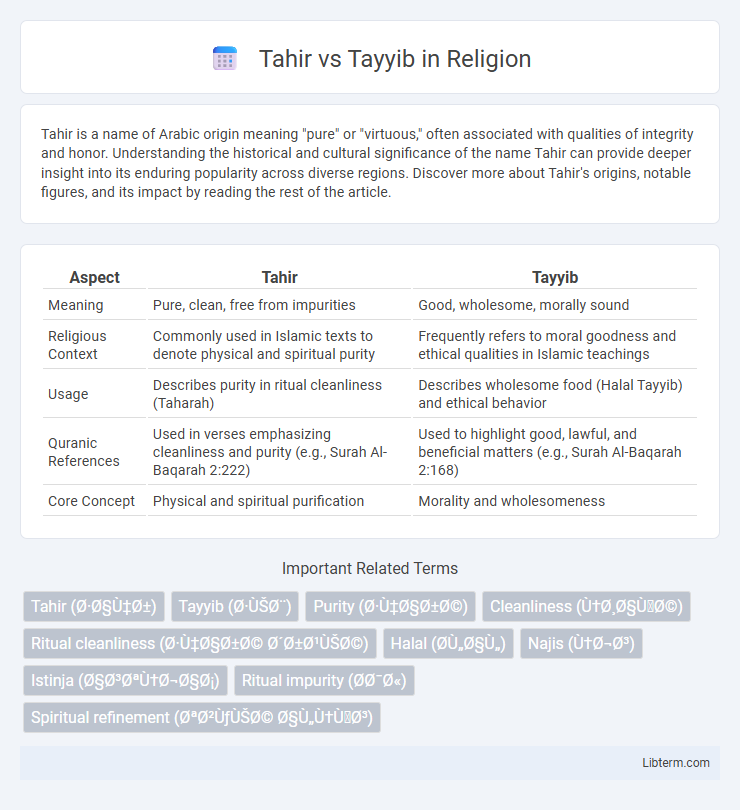Tahir is a name of Arabic origin meaning "pure" or "virtuous," often associated with qualities of integrity and honor. Understanding the historical and cultural significance of the name Tahir can provide deeper insight into its enduring popularity across diverse regions. Discover more about Tahir's origins, notable figures, and its impact by reading the rest of the article.
Table of Comparison
| Aspect | Tahir | Tayyib |
|---|---|---|
| Meaning | Pure, clean, free from impurities | Good, wholesome, morally sound |
| Religious Context | Commonly used in Islamic texts to denote physical and spiritual purity | Frequently refers to moral goodness and ethical qualities in Islamic teachings |
| Usage | Describes purity in ritual cleanliness (Taharah) | Describes wholesome food (Halal Tayyib) and ethical behavior |
| Quranic References | Used in verses emphasizing cleanliness and purity (e.g., Surah Al-Baqarah 2:222) | Used to highlight good, lawful, and beneficial matters (e.g., Surah Al-Baqarah 2:168) |
| Core Concept | Physical and spiritual purification | Morality and wholesomeness |
Introduction to Tahir and Tayyib
Tahir and Tayyib are two Arabic names with distinct meanings and cultural significance. Tahir means "pure" or "clean," often symbolizing spiritual and moral purity, while Tayyib translates to "good," "kind," or "wholesome," reflecting benevolence and pleasantness. Both names are commonly used in Muslim communities and hold positive connotations related to character and virtue.
Historical Background: Tahir vs Tayyib
The historical background of Tahir and Tayyib centers on the early Islamic period, where Tahir was a prominent figure in the Abbasid Caliphate known for his administrative role as governor of Khorasan. Tayyib, associated with the Tayyibi Ismaili sect, emerged later with a focus on religious leadership and succession disputes following the Fatimid Caliphate's decline. Understanding their contrasting roles highlights the political and theological tensions that shaped Islamic history during their respective eras.
Core Differences Between Tahir and Tayyib
Tahir and Tayyib differ primarily in their linguistic roots and meanings; Tahir originates from Arabic meaning "pure" or "virtuous," often used to describe moral purity. Tayyib, also Arabic, emphasizes goodness and wholesomeness, referring to something that is pleasant, good, or desirable, often linked to food or character. The core difference lies in Tahir focusing on purity and cleanliness, while Tayyib stresses goodness and pleasantness.
Cultural Significance of Tahir and Tayyib
Tahir and Tayyib are deeply rooted in Islamic culture, symbolizing purity and goodness, respectively, which are core values in Muslim identity. The name Tahir signifies "pure" or "clean," often associated with spiritual and moral clarity, while Tayyib means "good" or "wholesome," reflecting virtues of kindness and ethical behavior. Both names carry cultural significance in Muslim communities, emphasizing the aspirational qualities of righteousness and integrity.
Tahir and Tayyib: Etymology and Meaning
Tahir originates from Arabic, meaning "pure" or "virtuous," often associated with spiritual cleanliness and moral integrity. Tayyib also stems from Arabic, signifying "good," "wholesome," or "pleasant," and is commonly used to describe purity in terms of kindness and quality. Both names share a semantic field related to purity and goodness but emphasize different aspects: Tahir focuses more on inner purity, while Tayyib highlights overall goodness and pleasantness.
Usage in Religious Texts: Tahir vs Tayyib
The terms Tahir and Tayyib frequently appear in Islamic religious texts with distinct but complementary meanings: Tahir denotes purity or cleanliness, often used to describe physical and spiritual states, whereas Tayyib signifies wholesomeness, goodness, and moral integrity, especially in relation to food and behavior. Quranic verses and Hadith literature emphasize Tahir in contexts such as ritual purification (tahara) required for prayer, contrasting Tayyib which characterizes permissible sustenance and righteous actions. Understanding these nuanced differences enhances comprehension of ethical guidelines and spiritual practices within Islamic theology.
Social Implications of Being Tahir or Tayyib
The social implications of being Tahir or Tayyib often revolve around cultural perceptions tied to purity and goodness, as both names carry meanings associated with cleanliness and righteousness in many Islamic communities. Individuals named Tahir, meaning "pure," may experience expectations of moral integrity and honesty, while those named Tayyib, meaning "good" or "wholesome," may be seen as embodying kindness and virtuous behavior. These perceptions influence social interactions, personal identity, and communal roles within societies where names reflect deeply held values.
Modern Interpretations and Applications
Modern interpretations of Tahir and Tayyib emphasize their roles as foundational concepts in Islamic theology, representing purity and wholesomeness in intention and action. Contemporary scholars apply these terms in ethical discussions, advocating for sincere, unblemished faith (Tahir) and morally good, beneficial deeds (Tayyib) to foster spiritual integrity and social harmony. These principles influence Islamic jurisprudence and daily practices, encouraging believers to embody inner purity and outward righteousness in a rapidly evolving world.
Common Misconceptions About Tahir and Tayyib
Tahir and Tayyib are often confused due to their linguistic similarities, but Tahir means "pure" or "clean," while Tayyib means "good" or "wholesome." A common misconception is that both terms are interchangeable in describing people or food, yet Tayyib specifically refers to something that is not only pure but also beneficial and pleasurable. Understanding these distinctions is essential in contexts such as Islamic teachings, where Tayyib carries a broader ethical and spiritual significance than the more limited concept of Tahir.
Conclusion: Choosing Between Tahir and Tayyib
Choosing between Tahir and Tayyib hinges on their distinct qualities and applications; Tahir embodies purity and cleanliness, often associated with physical and spiritual purity in Islamic contexts. Tayyib emphasizes wholesomeness and goodness, reflecting moral integrity and the inherent goodness in actions and substances. Understanding these nuanced differences allows for more precise use in religious texts and everyday language, enhancing clarity and meaning.
Tahir Infographic

 libterm.com
libterm.com